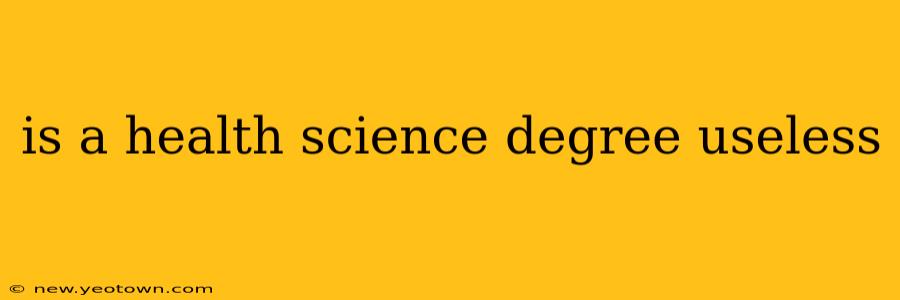Is a Health Science Degree Useless? A Journey Through Career Paths and Possibilities
The question, "Is a health science degree useless?" is a loaded one, echoing the anxieties of many prospective students navigating the complex landscape of higher education. The answer, like a good medical diagnosis, requires a nuanced examination. It's not a simple yes or no, but rather a complex tapestry woven with career paths, personal aspirations, and the ever-evolving healthcare industry. My journey through this topic will explore various perspectives and hopefully provide a clearer picture.
Let's begin by understanding what a health science degree is. It's a broad field, encompassing a wide range of subjects like biology, chemistry, anatomy, physiology, and public health. It's often a stepping stone to further education or a direct entry into certain healthcare roles. This inherent breadth is both its strength and, for some, its perceived weakness.
What are the career options with a health science degree?
This is where the narrative shifts from potential uselessness to a vast array of opportunities. Many assume a health science degree leads only to medical school. While that's certainly a pathway, it's far from the only one. Think of it as a versatile foundation upon which you can build a rewarding career.
Direct Entry Roles: Some graduates find immediate employment as:
- Medical Assistants: Assisting physicians with clinical and administrative tasks.
- Health Educators: Promoting wellness and disease prevention within communities.
- Pharmaceutical Sales Representatives: Connecting pharmaceutical companies with healthcare professionals.
- Research Assistants: Contributing to vital medical research.
- Health Information Technicians: Managing patient records and health information.
Further Education Pathways: A health science degree can serve as a springboard for advanced studies, including:
- Medical School (MD, DO): The classic route for aspiring physicians.
- Dental School (DMD, DDS): For those interested in oral health.
- Physician Assistant School (PA): Providing comprehensive medical care under physician supervision.
- Physical Therapy School (DPT): Helping patients regain mobility and function.
- Occupational Therapy School (MOT, OTD): Assisting patients in performing daily tasks.
- Nursing School (BSN, MSN): Becoming a registered nurse and potentially pursuing advanced nursing roles.
- Public Health Master's Programs (MPH, MSPH): Focusing on community health and disease prevention.
Is a health science degree worth it if I don't want to go to medical school?
Absolutely! As the diverse career paths outlined above demonstrate, a health science degree is far from useless for those without medical school aspirations. Its value lies in its versatility and ability to equip graduates with a strong scientific foundation and critical thinking skills applicable to numerous fields.
What are the advantages and disadvantages of a health science degree?
Advantages:
- Versatile foundation: Opens numerous career paths, both directly and through further education.
- Strong scientific base: Develops crucial critical thinking and problem-solving skills.
- High demand: The healthcare industry is booming, creating plenty of job opportunities.
- Meaningful work: Offers the chance to make a real difference in people's lives.
Disadvantages:
- Highly competitive: Securing admission to advanced programs can be challenging.
- Potentially large student debt: Further education can be expensive.
- Broad scope: May lack specialization at the undergraduate level.
How can I make my health science degree more valuable?
To maximize the value of your health science degree, consider:
- Gaining practical experience: Seek internships, volunteer work, or research opportunities.
- Developing strong communication skills: Effective communication is crucial in healthcare.
- Networking: Connect with professionals in the field to learn about career paths and opportunities.
- Focusing on a specific area of interest: Choosing a concentration or specializing within health science during your degree can make you a more desirable candidate.
In conclusion, a health science degree is not useless. Its value is determined by your individual goals, ambition, and dedication to pursuing opportunities within the vast and dynamic field of healthcare. It's a stepping stone, a foundation, a beginning – not an end. The true measure of its worth lies in the fulfilling and impactful career you build upon it.

